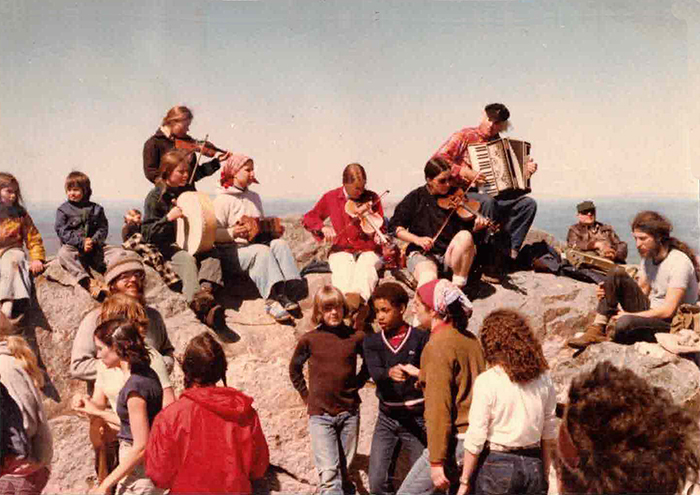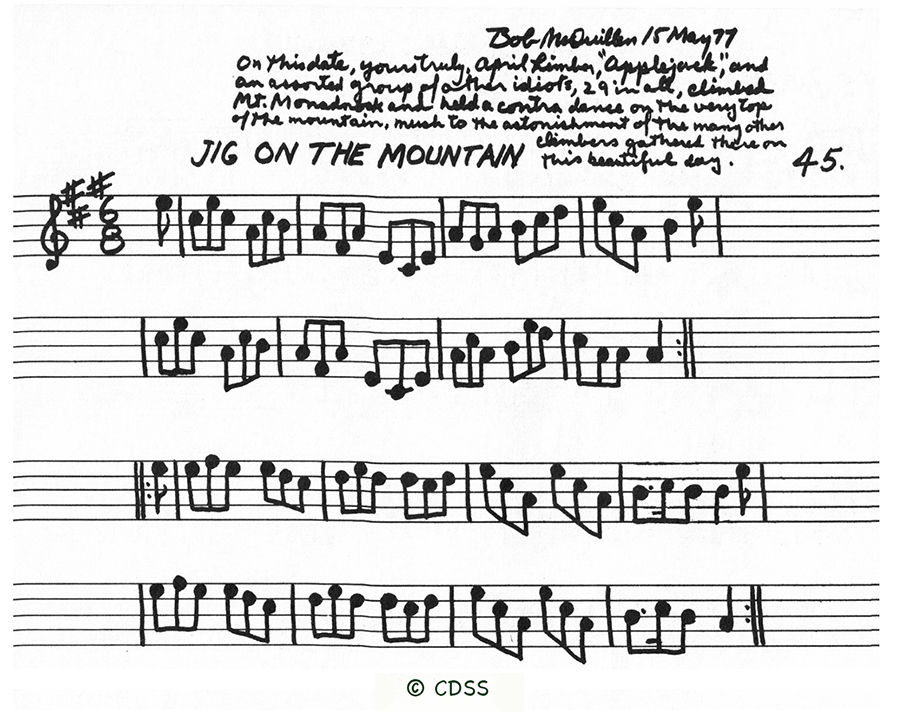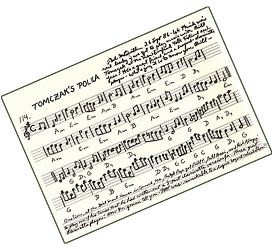Stories and Remembrances


Allyson Goes to Mississippi on December 31!
Allyson Purpera only learned of the Play ALL the Tunes project in the last few weeks of 2023. She had seen a post on the Remembering Mac Facebook page with the US map still missing a few states, including Louisiana, where she lives.
Determined to see Louisiana turn green - and intrigued by the race to the finish line to play all the NH tunes, she set her mind to it, playing the last ten tunes in the book on December 17. When NO ONE had reported a tune played in Mississippi by New Year's Eve, she got in her car and drove there, with her fiddle, and played Laurie's Waltz, Fred's Jig / Dinah's Jig, My Mother's Waltz, Jay & Molly's Waltz, and Scotty's Waltz for an audience of deer, reading the tunes we posted on Facebook on her phone. Extraordinary!
Click here to see her splendid photos.
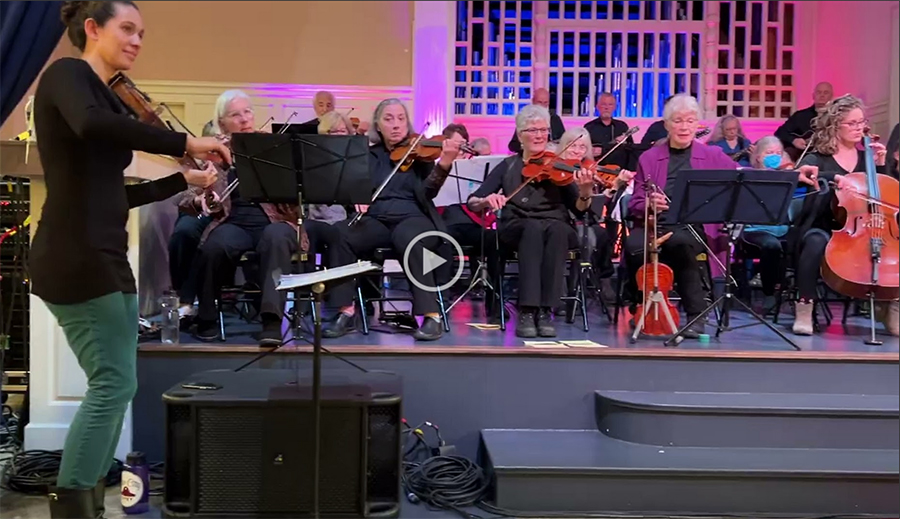
Fiddle Orchestra of Western Massachusetts (and a musical saw!)
The Fiddle Orchestra of Western Massachusetts, led by Annika Amstutz, plays Multnomah March - a Western Mass favorite - at their Fall 2023 Concert. It's hard to see but the woman in the purple jacket in the front row is playing a musical saw. You don't see that every day!
Early 1970s
In the early and mid 1970's Allan Block would hire me to call for the monthly Francestown Dance and Allan and Bob would provide the music. In the summer of 1976 the very first NEOFA conference was held at the High Mowing School and I was hired to call a dance for the event. I hired Bob and Allan to be the musicians!
Chris Madigan, E. Alstead NH
More from Barry "The Dancing Bear" Nielsen
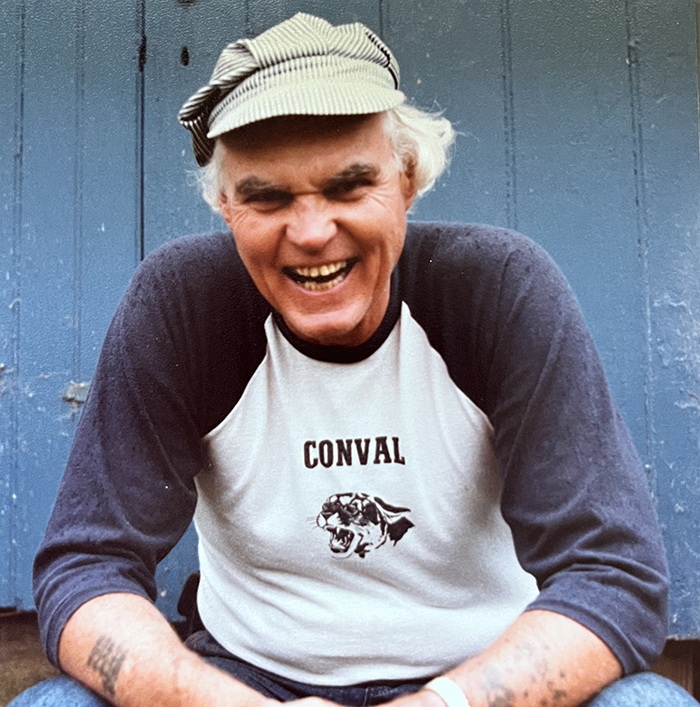 I've had some additional thoughts as the year draws to a close, and I also wanted to give you another picture I took of Mac while there may still be time for you to use it. I took it in 1982 at his house in Dublin right after I was discharged from the Marine Corps, so it brings the story line from "Barry's Reel" full circle.
I've had some additional thoughts as the year draws to a close, and I also wanted to give you another picture I took of Mac while there may still be time for you to use it. I took it in 1982 at his house in Dublin right after I was discharged from the Marine Corps, so it brings the story line from "Barry's Reel" full circle.
At the event in Peterborough this summer, many people commented on Mac's generosity, and as a close friend of his, I was probably the recipient of that more than most. Since I was his weightlifting protégé, he took great joy in keeping me well-fed, normally with high-protein meals. He'd grill steaks outside, fry eggs inside, and he'd bring me out to eat in nice Manchester restaurants.
When I went to boot camp, my Pontiac GTO needed a clutch. He probably knew how much I liked that car, as we were both "car guys," and the next time I came back to NH on leave, my muscle car had a brand-new clutch! If memory serves, he'd also replaced the exhaust, which I didn't even know it needed. I still regret not properly thanking Mac for all of that, but sometimes it's only in hindsight that one realizes these things and how important someone else was to them (especially as a kid).
When the "Pumping Iron" movie debuted in Boston, not only did Mac bring me to see it, but he also had gotten VIP tickets to the reception afterwards. We had just entered the room when Arnold Schwarzenegger (the star of the movie) walked through the doors. As a young high school student, the opportunity would have been lost had I been alone, but Mac spoke to him in German as he walked past, and that caused Arnold to stop and chat with us privately for a few moments before a bunch of the other attendees saw him and converged. As a young weightlifter, that was the highlight of my year and a "Mac story" I've told many times to other weightlifters!
I was also honored to sit with Mac during the first showing of a movie about his life, "Paid To Eat Ice Cream" at the University of New Hampshire. It was totally by chance that I was in Jaffrey visiting my mother when she mentioned the event, so I drove over. When I checked in at the MUB and was explaining that I'm "The Dancing Bear" and looking for Mac, the conversation was overheard by Sarah Bauhan, and she kindly escorted me across campus to where Mac was having lunch. We all enjoyed the movie together later that day.
I guess more than anything, Mac was generous with his time. I probably spent 1000 hours with him in his weight room, hung out with him at his house often, and I can't begin to count the number of times I sat on his piano bench next to him at contradances. Whatever we were doing, it was always a good time, and there was never a shortage of jokes. Sometimes, I wonder where he got them all, but I never thought about it back then. I guess I took it for granted until it was too late, but I'm thankful for the times we got to spend together even in the later years, before he passed. I just wish I had another chance to tell him how much he meant to me.
To say I miss him would be an understatement!
Lady of the Lake
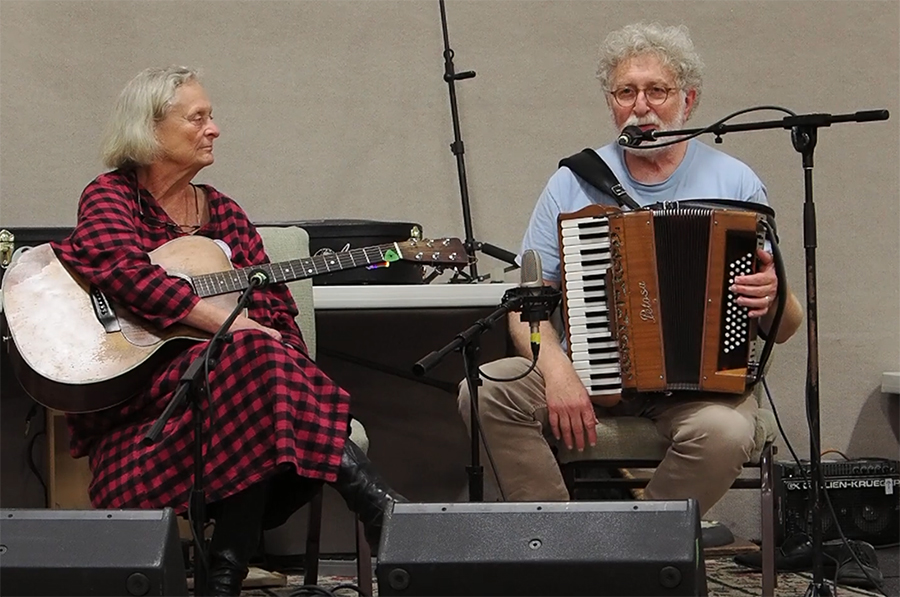
Laurie Andres, accordion and Sandy Bradley, guitar, remember Bob and play his tunes at
Lady of the Lake Fall Weekend 2023. See the video on YouTube.
He is Missed
Penn Fix writes:
I began contradancing in the fall of 1977 while teaching at Murray Road School, a public annex of newton North High School. I often found myself dancing in the Monadnock Valley - with wonderful memories of dances in Francestown, harrisville, and Dublin. I have a recording which I have donated to UNH Ralph Page archives of a dance celebrating Mac's 55th birthday. It was held in the basement of a church across the street from the Dublin town hall (June, 1978).
After I returned home to Spokane in November, 1979, I began organizing contra dances and actually started calling. In 1981 I offered the first Lady of the Lake Fall Weekend. In 1984 I hired Mac, April, Pete and Ted Sannella. This was one of several milestones that Mac shared with Lady of the Lake. It marked the first time we had hired both a caller and band from New England. We introduced Mac to the Northwest, which became his home away from home. In 1986, Mac was on staff for our first June week. And in 1993, he was on staff when we christened our outdoor dance pavilion (we had fundraised, designed, and built it for the camp). We also celebrated Madc's 70th birthday with a wonderful party featuring handmade party hats including one that was in the shape of an accordion. Over the course of nearly 25 years, Mac was on staff 10 to 15 times (attending all three camps).
Like so many others, Mac showed his gratitude by writing tunes for our LOL community. I count at least 10. He also donated money to have the camp's piano keys restored. He is missed.
Shoshanna's Jig, Book 9
Many decades ago, Bob found me one day sitting on an outdoor bench at Elkins, WV (Augusta Heritage old time week, probably) playing Black Friday. Someone in my band had found it and we enjoyed playing it together.
The next time he saw me playing outside, he put down a bunch of his books and said, “If you don’t want ‘em, use ‘em in the outhouse.” And kept walking. That was the beginning of a dear friendship. Years later (decades later), he revived Black Friday and put it on one of his CDs, and it sounded like the way we played it. I’m happy to have helped revive this tune for him.
Shoshanna Schwimmer
Bob's Generosity
Dave Kleinschmidt and Michael Seiser played New England Winter and The Dancing Bear (both Book 3) for a memorial contra dance in Cuyahoga Falls, OH on October 21. Dave sent this remembrance:
One evening at a Francestown dance (with him and Alan Bloch on fiddle), he heard I had started playing contra piano thanks to a workshop he'd given, and immediately handed me a signed copy of Note Book #8 and a cassette of Farewell to the Hollow. I still have both of those items 30 years later.
Melody's Jig, Book 10
Jane Orzechowski's niece, Laurel Herrick, writes: "We flew to Missouri for a dance weekend one time. (My aunt is Jane Orz.) and Mac taught me and my brother how to play backup piano chords! Not sure how much of it I remember, but I loved learning from him and he mailed me his chord charts which I still refer to. :)"
Milo's Reel, Book 13
Milo Stanley writes: "I recall getting a ride home from Maine Fiddle Camp in the backseat of the bread truck, the backseat being a canvas chair that may or may not have been secured to the floor. And exchanging letters... Bob was a great correspondent. Thank-you for putting together this project!"
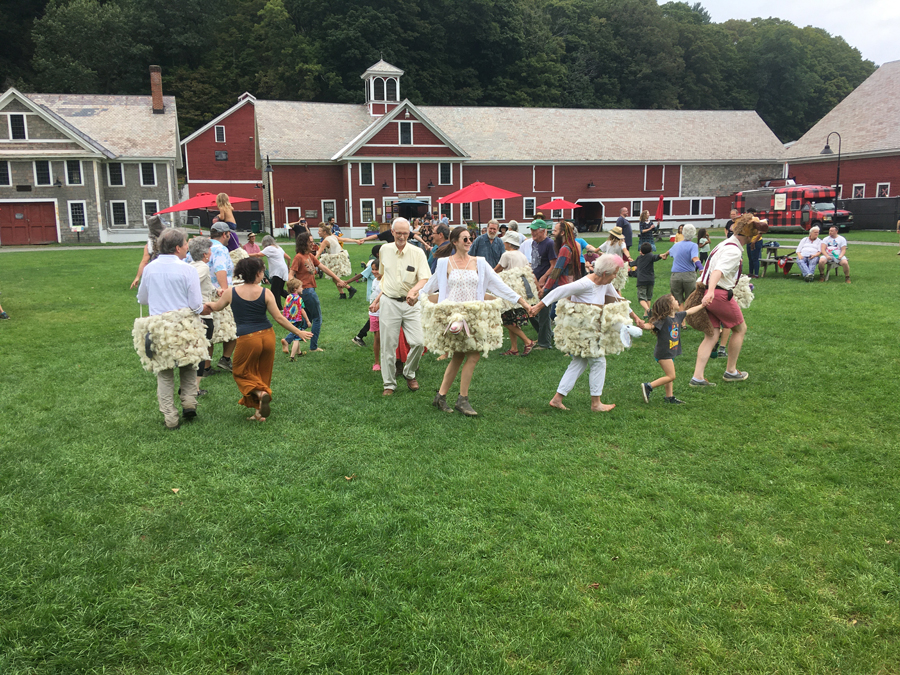 Sheep!
Sheep!
The Sheep Band played Pete's March (Book 4) as part of the Sheep Suite for the Sheep Dance - a magnificent display of puppetry, humor, traditional dance and music for Sandglass Theater's 'Puppets in Paradise' event at the Retreat Farm in Brattleboro on September 9, 2023.
Audience was invited to join the dance when the sheep were safely through their dance, thanks to the sheepdog and a quick-thinking lamb.
You can see a snippet on YouTube from the end of Pageant, which involved a dozen sheep, bells ringing, bleating; a sheepdog; a wolf in sheep's clothing; a contra dance; several other tunes; and quick thinking by a lamb. A tour de farce!
A Mac Memory
He was at Dance Week at the Augusta Heritage Center, in Elkins, WV, and one year I was making my way back to Concord after an exhausting five weeks teaching there. I was just outside Peterborough, driving through road construction, when I saw the Kwack-van approaching (he already had been home for a week), and we were paused opposite each other, with a state trooper standing on the road between us.
Undeterred, Mac stuck his head outta his van and bellowed, "Hey, R.P.! The f'kn dance is the othah f'kn way!" Me: "Mac, I have just enough energy to make it to Concord!" Mac: "That's no f'kn excuse! Turn yaself around and follow me NOW!" Me (grinning): "Well, damn yer eyes, Mac!" Mac: "Damn yers, too--now turn around! Get ovah there!" Of course I turned around; home had to wait for a few hours more; after all, I had been away for two months. That poor trooper, whipping his head back and forth, wondering what the hell was going on.
When Mac found that I was raised in a USMC household, he took to regularly cussing me out with a grin, and I gave it right back. . . Semper Fi, Marine.
R. P. Hale
A Mac Memory
A Bob story: at one of the Saratoga Flurries, Bob was playing the piano in a hallway alcove. I sat for a while listening, then we spoke. I told him I had always wanted to play and felt I would take it up when I could no longer dance. Bob told me he had a charted method for learning chords and would send it to me if I’d like. I asked could I pay? Of course not was the response. Told him I felt uncomfortable. Did he like to read? "It happens I have an interest in Lincoln," was the response. Addresses were exchanged and packages sent, Bob’s arriving in an interesting envelope. What a terrific person he was.
Peggy Kane, NY NY
Two Photos from Ed Bonsell's Collection, Hatfield PA
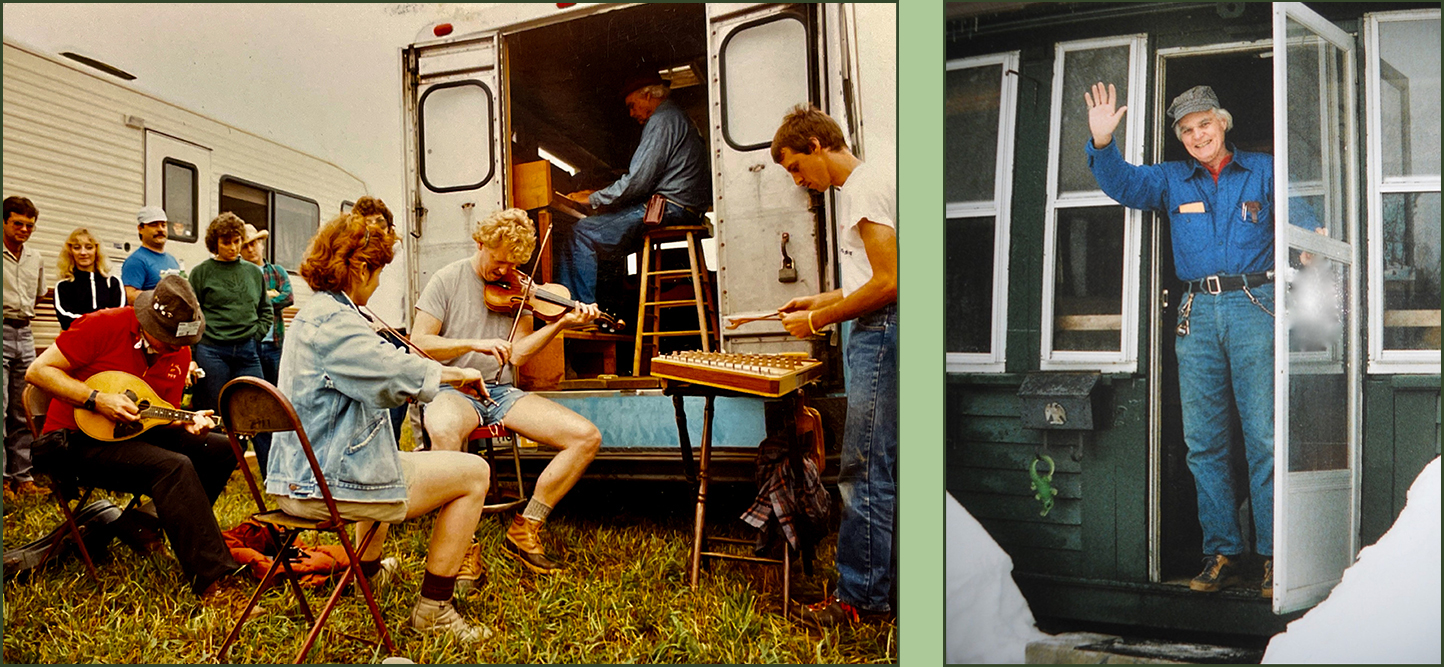
On the right: At the Mac Shack on Granite Road in Peterborough.
John Brennan and Ed Bonsell went up to New Hampshire to visit Mac, circa early 1980's.
On the left: The Mac-Mobile at the Philly Festival "At night sometimes we had 10 or 20 people playing around the back of Macs' rig."
McCullough & McIntyre
I picked a book at random, and it fell open to McCullouch's Hornpipe. I was surprised because I knew Paul McCullough (note correct spelling). He was an excellent caller with his own dance series here, a protégé and friend of Ted Sannella (whose 'Contra for Margie' was written for Paul's wife). Paul passed away several years ago but his impact on our dance community remains.
McIntyre's #2, on the facing page in Book 9. Another surprise--I also know Don and Diane McIntyre, although they moved to Alaska years ago, and I haven't seen them since. Diane was my daughter's Suzuki teacher and as such, she was my first fiddle teacher.
Sue Songer of Portland Collection fame, Portland, OR
Captain Fiddle
I first met Mac in 1976 at a dance in New Hampshire. We became friends, eventually playing dances together and running into each other at far flung events in places like Seattle, Philadelphia, and Elkins, West Virginia. I was honored when he presented a copy of his tune book 10 to me in 1994, inscribed, "For Captain Fiddle, Ryan Thomson, a good friend, with best wishes always, from Bob McQuillen."
There is annual Irish event on Grand Turk called "Tunes on Grand Turk." My son Brennish Thomson was hired in 2022, as one of the featured players at the first event. He was asked back again in 2023. I decided to tag along just for the fun of it all. Of course I've been playing Ryan's Reel for many years. It has become part of a regular set that I play for Irish sessions. So It was natural for me to play it, probably for the very first time, by anyone, in the Turks and Caicos. Thanks Bob!
Ryan Thomson, 'Captain Fiddle', Newmarket, NH
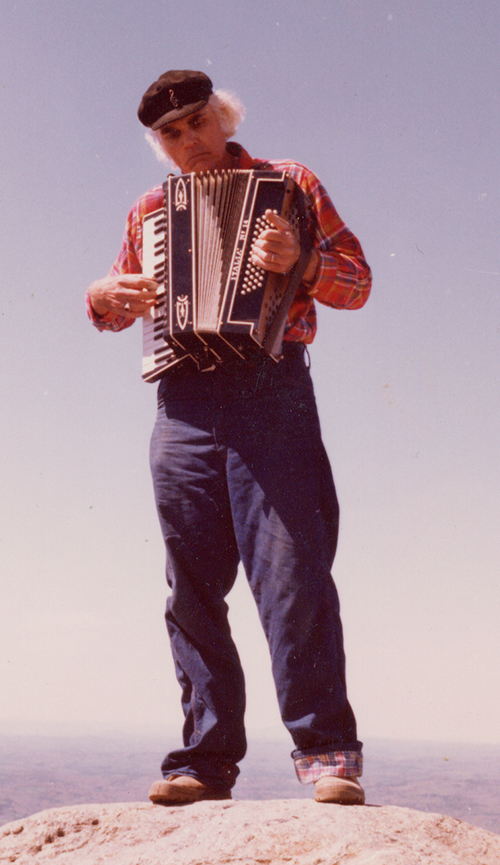
Jig on the Mountain
"May 15, 1977 - On this date, yours truly, April Limber, "Applejack," and an assorted group of other idiots, 29 in all, climbed Mt. Monadnock and held a contra dance on the very top of the mountain, much to the astonishment of the many other climbers gathered there on this beautiful day.
Were you there? Do you remember who else was there? Let us know what you remember. [email protected].
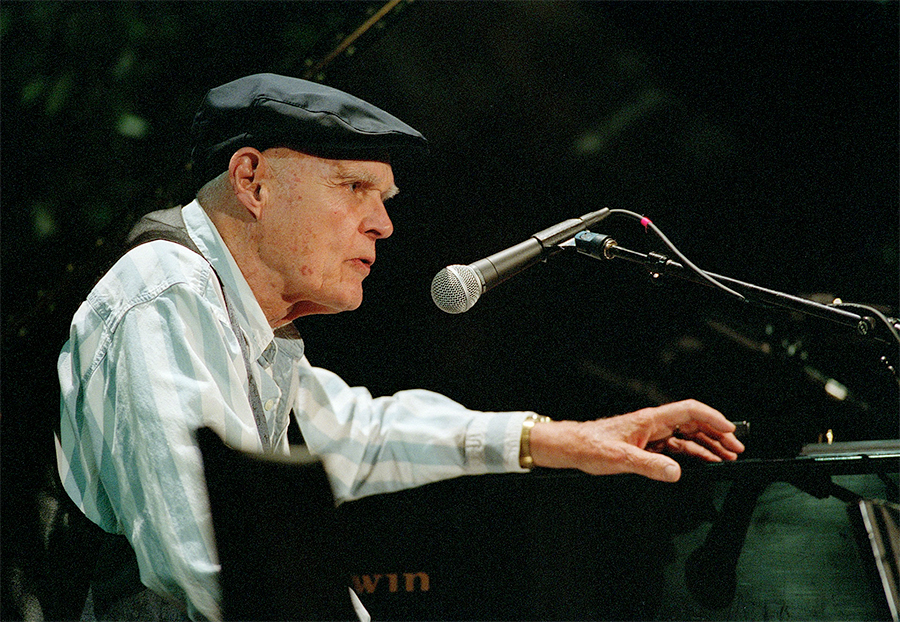
Gaelic Roots Festival
Bob McQuillen at the mic after receiving an award of recognition from the Boston College Irish Studies Program. It was taken during the 2003 Gaelic Roots Festival's Farewell Concert, June 21, 2003 at Robsham Theater, Boston College. The festival was created and directed by Séamus Connolly. Bob was an honored guest at the festival that year. Photo © Boston College
Visit Séamus Connolly’s Irish Music Collection at Boston College.
Photo Courtesy Elizabeth Sweeney, Librarian / Irish Music Library / John J. Burns Library / Boston College
Orzechowski Family Animals
A Love of Dogs
He loved all dogs and they loved him back. Although, probably they were so attentive to him because he would constantly be giving them snacks under the table. He’d start with tidbits from his dinner plate and end with dividing up Oreo cookies with each dog. We often had at least 3 dogs around and sometimes other visiting dogs, as well. If we were outside cooking burgers in the yard, he’d request that his hamburger be just barely browned on the outside (so pretty much raw in the middle) and then he’d consume most of it and share the rest with any dogs that happened to be around. A favorite trick of his whenever he met a new dog friend was to bring its face up to his mouth and he’d close his lips right around the dog’s nose and then blow! This caused the dog’s lips to flap out sideways in a ludicrous manner and also caused Mac to laugh uproariously himself. Usually no dog would allow him to attempt this trick a second time.
Mowgli & The Tooth
Another time, he was on the floor having a tug-of-war using his handkerchief with Mowgli, our black lab, and he got the bright idea of biting the handkerchief himself. Well, Mowgli won that bout because Mac’s newly implanted tooth flew across the room. We were horrified but he was in stitches as he imagined how his dentist was going to react when he heard the story.
All the Animals
He wrote tunes for all of our pets including a hambo for the horse, a jig for Sophie’s chicken named Odysseus who unexpectedly laid an egg and was rechristened Odyssea, tunes for our goats and for quite a few of our dogs over the years.
"I'm as good as I get!"
Many of his other tunes were written for all the pets of his musical and dance friends. Our favorite responses from Quack: “I’m as good as I get!” with the happiest grin and enthusiastic voice. “It’s fun to be dumb” whenever he did or said something silly, which was often.
The Chicken
Favorite habit of his: to anybody new (waitress, policeman, TSA employee, etc.) he’d bring out his chicken joke which they usually couldn’t answer. “Which side of a chicken has the most feathers?” – “the outside”. We heard him do this innumerable times to all sorts of people and never got tired of their reactions.
From Jane Orzechowski
Full Moon Over Peterborough (edited version)
In my first winter in New Hampshire, I had a date to play the Peterborough contra dance with Bob McQuillen at the piano and Mary DesRosiers calling. That December featured record low temperatures and it was snowing during the dance. All night long Bob complained about being cold.
About 11 pm, in between dances, Bob didn't so much ask as he commanded:
"This next one will be the last set, right?"
Mary was perplexed, "Why?"
"Because I'm freezing my ass off!"
Mary's next move was, shall we say, poorly thought out:
"Why don't you show us, Bob?”
And ... Bob ... did. He stood up from the piano bench, faced upstage (I was right there, arm's length from him) and ...
Dropped trou.
Being face to face with him meant that I had either the worst or the best vantage point in the house. Depending on how you think about it. I can tell you the people on the dance floor had quite a view.
True story.
Read the unexpurgated version here.
Bo Bradham
Bob said he’d never been so cold playing music...
David Millstone had recruited Bob, me, and a few others for a contra dance scene in a film which some film student was doing for a project - the story supposedly taking place in 1876. The scene was filmed in an unheated barn in Fairlee, VT in late October, and we all wore down coats between takes. Bob said he’d never been so cold playing music, BUT…he nevertheless interrupted the filming with one of his famous loud outbursts, to tell everybody about the historical piano he was playing on (a 1880s-era horizontal square piano).
It’s fair to say Bob’s antics while playing were one of the things that drew me to the Contra Dance scene way back in college - in my mind he was part of the definition of New Hampshire, no less than the mountains, the granite, and town meetings (I was, before I retired, a lawyer for quite a few small NH towns). When Bob died, the whole world seemed a little less complete, even to someone like me who never knew him well.
I remember a workshop he led somewhere with musicians sitting in a circle, and the first thing he said was “We’re gonna start with Little Burnt Potato…unless I hear any contrary motions from the floor!”
And at the UNH premier of David Millstone’s film “Paid to Eat Ice Cream,”when “Amelia” is heard playing over the closing credits, Bob and Amelia spontaneously started waltzing in front of the screen - no dry eyes in the house!
Bernie Waugh
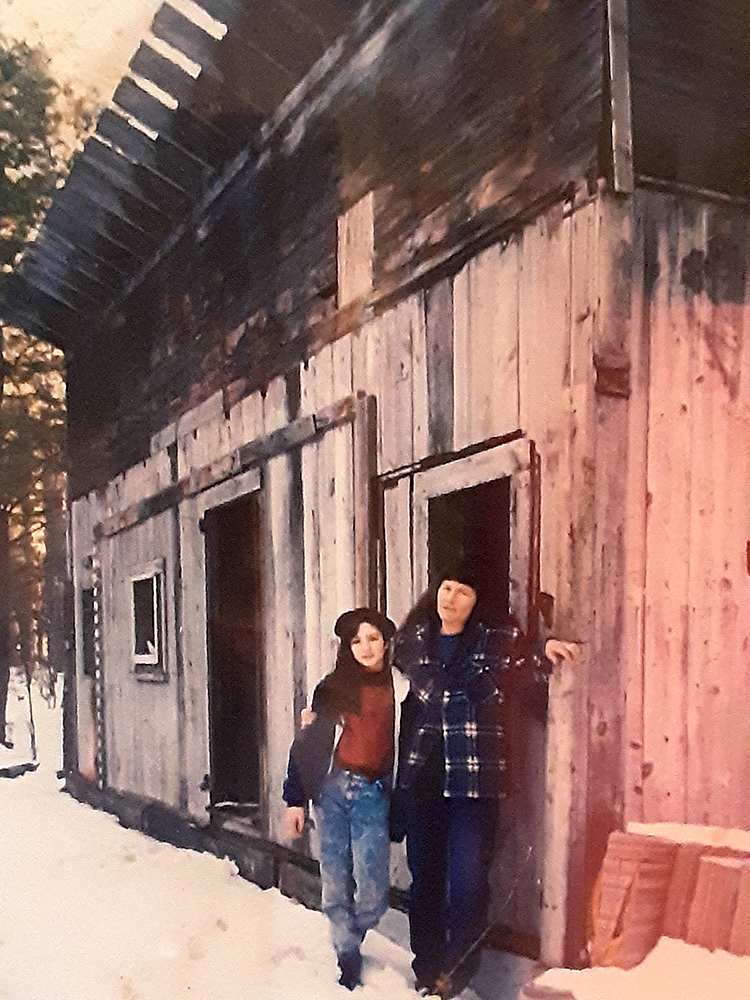
Lindbergh's Crate and composing "Amelia"
In Book 2 there is a tune, Lindbergh's Crate. The dedication reads: "Bob McQuillen Jan. '76 -
With Best Wishes to the Crate, and love always to the beautiful flute player dwelling therein.
P.S. It really was L.'s crate!
P.P.S. And there really is a flute player living in it. Her name is Deanna Stiles, and she's super neat!"
Curious about the history of the Crate, I looked into it and found a NH Magazine article that references both the Crate and Deanna: “A young woman lived there the longest, bringing her daughter into the world within the box’s four walls. The little girl was aptly named Amelia, in part for another aviation legend. The waltzing tune “Amelia” was composed for the 3-year-old girl by a local folk musician, to commemorate the unusual story from the woods of Contoocook. Years later it’s well known by contra-dancers and fiddlers across the country.”
Digging further I was able to find photos of the Crate in transit; and a Maine Public video clip about the Lindbergh's Crate Museum in Canaan Falls, ME. Next I found a reference to "Amelia" on a Danish Fiddle Tune website, of all places. Along with the tune is a citation from an interview with Bob from the time he received the National Heritage Fellowship, where he tells how the tune “Amelia” came to be. A little more digging and I found the full interview with Mary K. Lee, who misspelled both Deanna's and Amelia Earhart's names and she asked Bob what the words to "Scotty O'Neil" were; clearly she did not do her homework either before the interview or after it, nevertheless it's worth reading the entire interview. Here is the excerpt that showed up on the Danish transcription of "Amelia".
Q: What about the song Amelia? That's also one of your songs, right?
McQuillen: Let's see, this is sort of complicated. After Charles Lindbergh flew across the ocean in the Spirit of St. Louis, the thing was to get the plane back. They took the wings off and put them in one crate and the fuselage in another, then sent the whole thing back to this country aboard ship. I don't know where the wings box went but the fuselage crate eventually wound up on the banks of the Black Water River in Contoocook, a little town in New Hampshire. Somebody then took the crate and put a slanted roof on it and made a little cabin out of it. So now we got Lindbergh's crate living in the woods on the shores of the Black Water River which is about fifty feet across and pine trees all around, a real pretty spot.
Now along comes Deanna Stiles and she lives in this thing for a while. She also develops a fondness for some dude and out of that we get the emergence of a cute little baby girl. Who, because this was Lindbergh's crate, was named ... go ahead ...
Q: Amelia?
McQuillen: After ...
Q: Amelia Earhart.
McQuillen: You got it. That's exactly why. About three years or so after, that was when I decided that Amelia ought to have a tune. And that's how it all happened.
A Beloved Staff Member
Bob was a frequent and beloved staff member at Northern Week at Ashokan where he taught, played for dancing and led a very popular Chestnut Jam each day. We had the honor and pleasure of playing a medley of Amelia and Ashokan Farewell at the Peterborough NH dance many years ago.
Jay Ungar & Molly Mason, W. Hurley, NY
Hear Jay and Molly play Jay & Molly's Waltz - Go to 30 min / 12 sec
A Source of Boundless Joy
I still have my mimeographed copy of Scotty O'Neil which, if memory serves, he gave me at the Munson Library in South Amherst back in the 70s. Bob came down to Mystic Seaport a few times when I ran music programs there which is what he alluded to in the dedication of Bob's Polka. We played together at festivals and whatnot over many years. When I last saw him a few months before he passed he was still wearing the Claddagh ring he bought on a visit to Mystic. He was a source of boundless joy in my life.
Bob Walser
 New Hampshire’s NEW ‘Man of the Mountain’ National Monument
New Hampshire’s NEW ‘Man of the Mountain’ National Monument
In 2002, Bob McQuillen was a recipient of a 2002 National Heritage Fellowship awarded by the National Endowment for the Arts, the US government's highest honor in the folk and traditional arts.
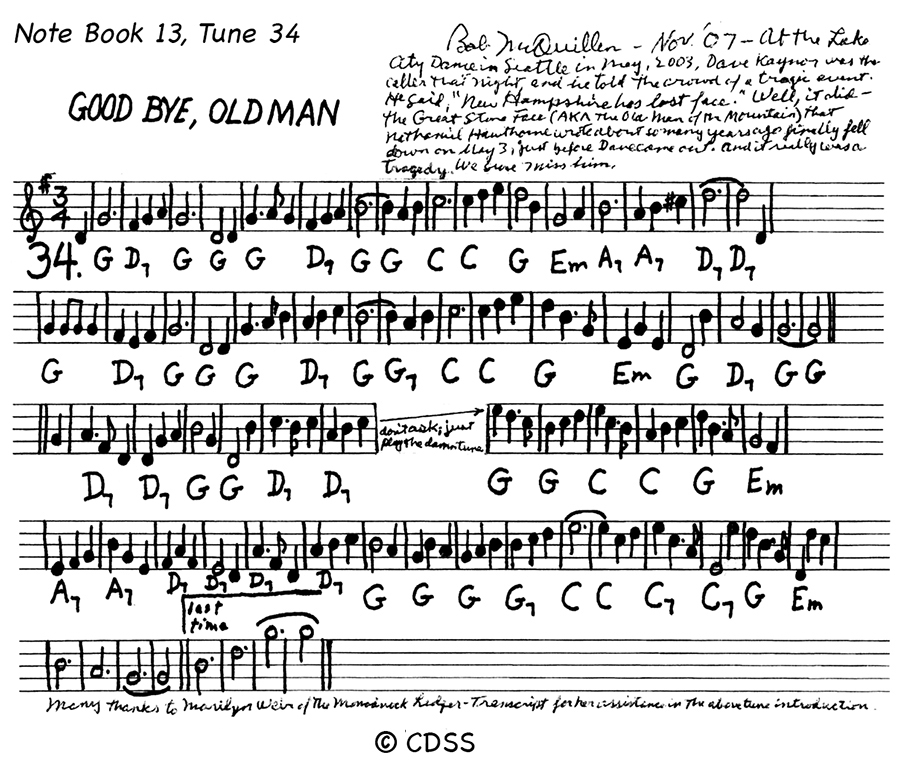 At the time, Hilliare Wilder made an off-hand comment to Bob: "I think they have made a national monument out of you." That phrase bounced around in Hilliare’s head for awhile, and after New Hampshire’s ‘Old Man of the Mountain’ crashed to earth in 2003, he created this great poster.
At the time, Hilliare Wilder made an off-hand comment to Bob: "I think they have made a national monument out of you." That phrase bounced around in Hilliare’s head for awhile, and after New Hampshire’s ‘Old Man of the Mountain’ crashed to earth in 2003, he created this great poster.
Richard Hart made a digital copy of it, and Hilliare showed up at Pierce’s Hall in East Putney, VT, on March 19 with a framed version for the hall, where Bob loved to play the local PSO (Piano-Shaped Object).
Good Bye, Old Man, Bob's tribute to New Hampshire's Old Man of the Mountain. The dedication reads, "At the Lake City Dance in Seattle in May, 2003, Dave Kaynor was the caller that night and he told the crowd of a tragic event. He said, "New Hampshire has lost face." Well, it did - the Great Stone Face (AKA The Old Man of the Mountain) that Nathaniel Hawthorne wrote about so many years ago finally fell down on May 3, just before Dave came out. And it really was a tragedy. We sure miss him. Many thanks to Marilyn Weir of the Monadnock Ledger-Transcript for her assistance in the above introduction."
One measure blocked out: "don't ask; just play the damn tune." Click the picture for a larger version of the tune.
"Heee Yaa!"
I first met Mac in 1972 as a 7th grader, when I started going up to the high school to lift weights in his after-school program (which he mentioned in his dedication for "Barry's Breakdown"). I lifted with him Mondays, Wednesdays, and Fridays for the next six years, and as we spent more time together outside of school I started going to dances and sitting onstage next to him on his piano bench. It was fascinating to watch from the perspective of the band and see him having so much fun!
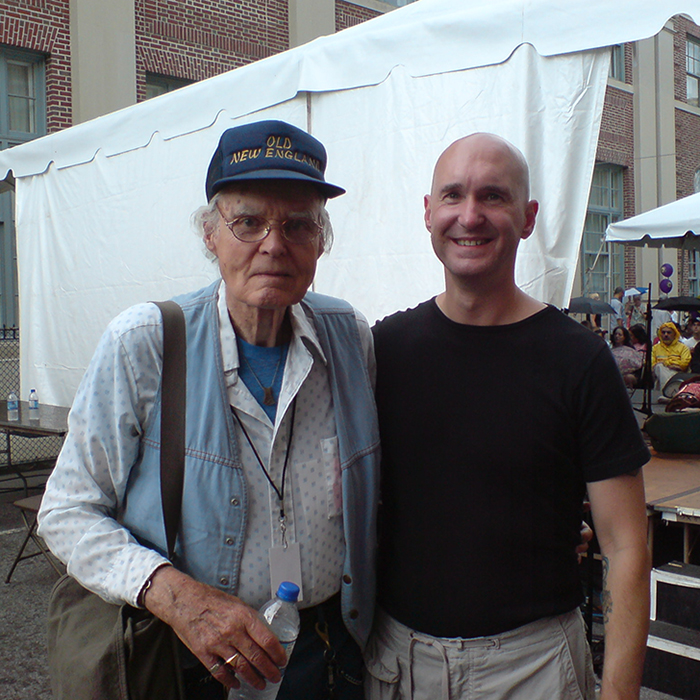 Mac was probably the most well-respected teacher in Con-Val, and he was the only person who could successfully get all the students in the cafeteria to stop what they were doing, bend down to pick trash up off the floor, and properly throw it away. This usually started with him bellowing, "Heee Yaa!" People who knew him probably know what I mean and how powerful his voice was. He even used to "Heee Yaa!" at houses of people he knew as we were driving by. I never knew when it would happen, and it's amazing how many people he was friends with!
Mac was probably the most well-respected teacher in Con-Val, and he was the only person who could successfully get all the students in the cafeteria to stop what they were doing, bend down to pick trash up off the floor, and properly throw it away. This usually started with him bellowing, "Heee Yaa!" People who knew him probably know what I mean and how powerful his voice was. He even used to "Heee Yaa!" at houses of people he knew as we were driving by. I never knew when it would happen, and it's amazing how many people he was friends with!
I was with Mac the day he finished writing The Dancing Bear on his piano in the living room of his house at Bond's Corner in Dublin. He played it for me, and when he asked, I told him I liked it, so he dedicated it to me. I didn't know he was going to do that, and until finding mcquillentunes.com I didn't know he'd dedicated any other songs to me. Fun fact: Bear is my nickname, but I only very rarely danced... maybe twice!
Mac had a huge impact on my life, and I went into the Marine Corps largely because of him. (He served our country in two different wars.) I know my enlisting had an impact on him because I see now that he dedicated Barry's Reel to me the same day I went away to boot camp. For many years, he wore the high school class ring I gave him on his pinky finger, and we stayed close even after I got out of the Marines until the day he passed.
As you can imagine, I have a lot of stories about our shared experiences through those many years...I really miss him.
Barry "Oso" Nielsen - The Dancing Bear
Bill Tomczak Meets Bob
I met Ralph Page at Marianne and Conny Taylor's Oktoberfest weekend in Stowe Vermont. Ralph was using recordings exclusively for calling dances and Marianne cooked up a scheme to have herself, Susan Worland, and me play for one of Ralph's dances. Ralph was thrilled beyond ecstasy, so much so that he invited me to join the band for a dance he was doing at the Brimmer and May school.
I don't remember who the fiddlers were, but Bill Possi and Rich Blazej were definitely there. Bob was playing piano, I had never met him before. And I simply can't resist telling this story.
The band was set up on the floor in front of the stage. I went to the foot of the stage right behind Bob and started assembling my clarinet. Bob stopped doodling at the piano, looked at me somewhat severely and said, "You fixin' to play that thing?"
I replied, "well, yes, I was asked to be here."
"Yeah? By who?"
"Ralph Page"
And Bob replied, "Well that's as good as any" and went back to doodling at the piano.
After we played the first dance, Bob immediately came over to me, stuck out his hand and said, "Hi! I'm Bob McQuillen!"
Tomczak's Polka
The dedication reads: "We think we're real lucky if we get to play music with Bill Tomczak at the New England Folk Festival each year. He's a great friend, and a superb clarinette player - What a joy it is to know you, Bill."
The notes at the bottom:
"One time at the Girl Scout House in Concord, MA., Ralph Page got Bill T., Bill Possi, and Rich Blazej to play one of his tunes that he had written out a 3-part clarinette version for. Three great clarinette players! Now I'm gonna tell you - THAT was remarkable to a degree beyond calculation!!"
Bob McQuillen, 26 Sept. '86
Click here to see Tomczak's Polka
But here is how Bill Tomczak thinks it went:
"I do vaguely remember playing in a similar configuration at the Scout House. I'm thinking it would have had to have been after the Brimmer and May dance, which I am as certain as I ever get was the first time I ever met Bob. It would make sense that the clarinet trio got played at the Scout House dance. One thing I'm quite certain of is that the tune was "The Clarinet Polka" and it was Rich Blazej who wrote it out. I seem to recall having held on to that music for a very long time."

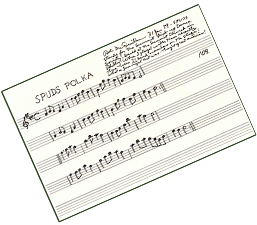 From SPUDS (Summit Pick-Up Dance Society):
From SPUDS (Summit Pick-Up Dance Society):
We reached out to Sarah Gowan, one of the organizers of the Summit Pick-Up Dance Band in the Philadelphia area, about Bob's SPUDS Polka in Note Book 7 - did they know it? Did they play it? Would they play it? She replied immediately:
"What a cool project! Sure, we know SPUDS Polka, it’s part of our open band repertoire and I included it in our book, Tuneadelphia, original compositions by people who have played with SPUDS. Attached it the permission page I got back from Bob allowing me to include the tune and a thank you he sent after the book was published.
We’ll make sure to get SPUDS Polka into one of our setlists this year and see if we can’t get a bit of video for you.
Thanks for reaching out!"
Click here to hear SPUDS play their tune on YouTube.
To see SPUDS Polka, The Tuneadelphia transcription and Bob's notes to SPUDS click here.
For more information about SPUDS click here.
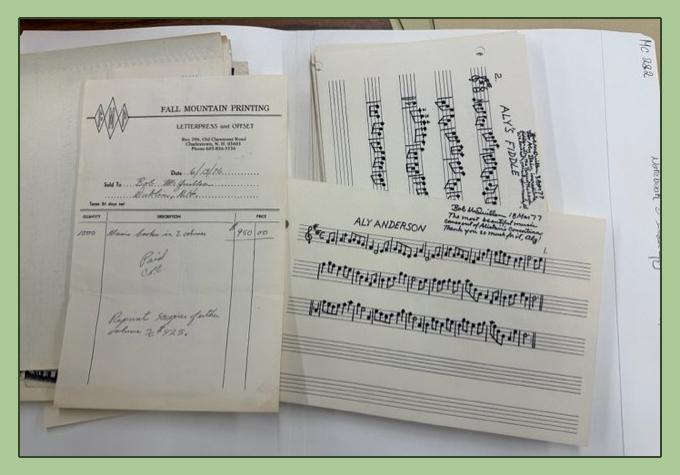 A Peek into the Bob McQuillen Collection in the Archive at University of New Hampshire, Durham
A Peek into the Bob McQuillen Collection in the Archive at University of New Hampshire, Durham
This collection consists of materials relating to and generated by the musical career of Robert Comer McQuillen (1923-2014). A significant portion of the collection consists of the original composition notebooks (1972-2011) in both standard musical notation and McQuillen’s system of solfeggio. These notebooks are accompanied by several galley proofs and the inked copies McQuillen produced for the publisher in preparation for the publication of Bob’s Notebooks 1-15.
Hundreds of individuals sent thank you notes for the tunes he wrote them; McQuillen saved every one, and the tunes they wrote him in return.
The collection consists of 23 boxes and one map case in 5 Series. Visit the Archive Website for a complete description of the collection.
Bob McQuillen Collection, 1930-2014, MC 282, Milne Special Collections and Archives, University of New Hampshire Library, Durham,NH, USA.
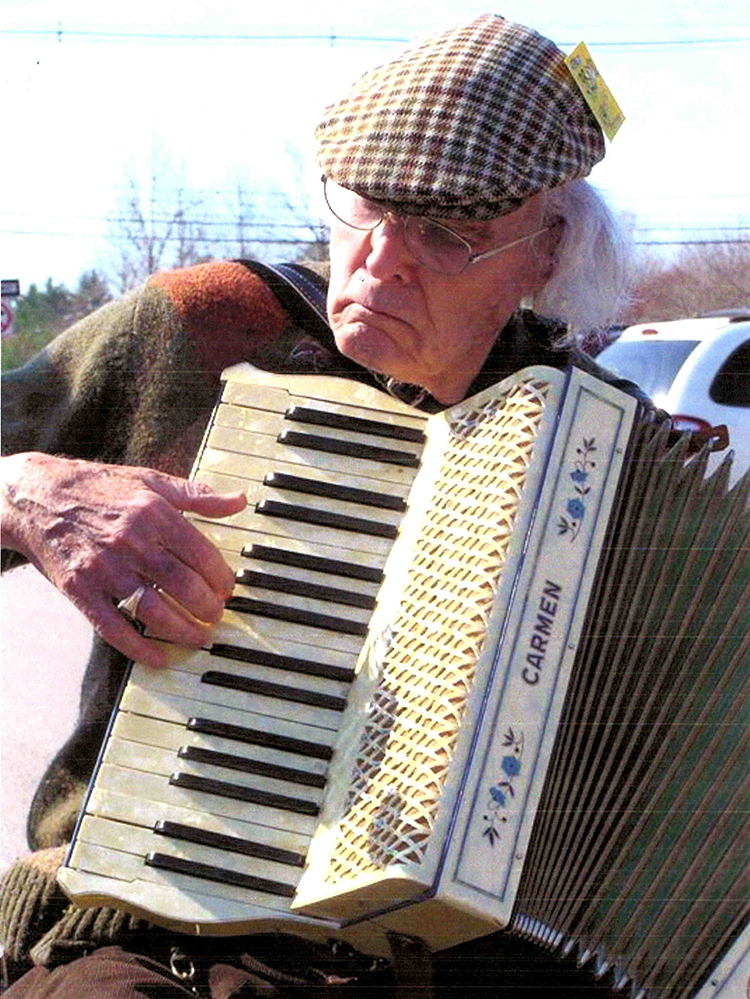 Woodland Dream, 'In Dedicato Memoriam' - February 4, 2023
Woodland Dream, 'In Dedicato Memoriam' - February 4, 2023
I’ve been playing the tunes pretty strictly in order up to this point. But Bob seems to have had a special relationship with this one, he describes it as an unusual tune because of the way it came to him. Sort of a mystical experience.
Today is the ninth anniversary of his death. I had to skip ahead and play this tune.
Justin Godin, Merrimack, NH
The Old PSO would get a workout
Mac was always willing to make the trek over to East Putney to play at Pierce's Hall when i asked him, even though the dance didn't generate enough money to pay him what he was worth. The old PSO (Piano-Shaped Object) would get a workout whenever he came and I loved the way his voice would fill the hall when he was amused by something happening!
Fred Breunig, Brattleboro, VT
A Memory
Bob bursting into a space yelling "What the hell is going on here!" Then cracking a big smile and laughing at all of the terrified faces of those who didn't know him.
Steve Hoffman, Thetford Center, VT
What an Inspiration!
I first heard Mac play on a cassette of the Canterbury Country Dance Band in the back seat of a car in Chapel Hill, NC. I immediately said, "I have to learn to play like this". And I did. Copied that tape and painstakingly learned my first tune measure by measure, copying Mac as best I could. What an inspiration!
Mary Cay Brass, Athens, VT
How I remember April Limber
Applejack was invited to play a community dance in a town hall somewhere in New Hampshire, sometime around 1980 or so, with Bob, April and Pete Colby. Tod Whittemore was the caller. Tod called the "Jingle Bells" singing square (one of the silliest dances ever devised). During the dance, April disappeared backstage, and reappeared with Christmas lights draped all over her, and jingle bells in both hands. She jingled through the whole dance. It was a sight to see, and I do wish there was a photo of it.
Laurie Indenbaum, Athens, VT
Keep The Flag Flying!
I am so happy to hear that you are remembering my good friend Bob McQuillen. I loved Bob and his music. I hold dear in my mind the wonderful night of music, hearing him play and seeing him honored with a special presentation at Boston College for his contribution to music and the Arts.
I have all of Bob's compositions in his published books and hold them with pride in my collection. Mr. MAC honored me by composing several tunes for my late wife Chrysandra and myself and that pleased me much.
Another of Bob’s masterpieces is Hetty's Hornpipe which is to be found in my collection on the internet. He, along with his wonderful Ladies (Old New England) recorded it in his home, and I was honored to play along with them. Hetty’s is a special favorite of mine, so to commemorate Bob and his music I recently taught the tune to a friend of mine here in North Carolina and I also played it on the Radio in Ireland. Of course, everyone loved the tune and wanted to learn more about the MAESTRO and his music. MAC was a dear friend and one of a kind! Keep The Flag Flying, as they say in Ireland.
Séamus Connolly
Séamus has three of Bob’s tunes in his splendid collection online: https://connollymusiccollection.bc.edu/
King of Contra Dance
King of the Keyboard reminds me of a family story.
Many years ago at the Northwest Folklife Festival, when I was a brand new fiddler, I was in a small jam with players at a similar musical level. Bob sat down to play with us—someone had a small, portable keyboard. I was thrilled. (I had no idea he would play with anyone, no matter their level.)
I had earlier promised my school-age daughters that I would watch a juggling act with them that afternoon, and that they should come find me at the jam when it was time. So they did. But I told them, "I cannot watch the jugglers with you. I am playing with the King of Contra Dance."
They managed fine without me, and for years after, when they saw me in a session, they would ask, "Are you playing with the King of Contra Dance again?"
Sometimes I was.
Susan Songer, Portland, OR
Still miss the guy.
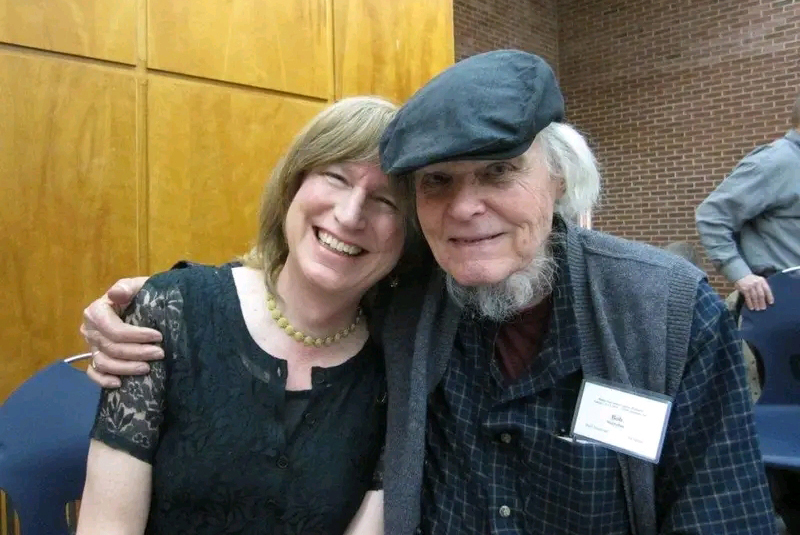
Kate Barnes and Bob McQuillen, Ralph Page Weekend in Durham, NH, sometime in this Century.
Mac called me his Guardian Angel...
While I lived in the Boston area (1974-79), I danced actively in the Monadnock valley. At that time, I was one of the few Boston dancers who would go up to dances in New Hampshire on a regular basis, in Francestown, Harrisville, and Dublin. Mac of course was a big part of this scene. I taped a dance held at the church across the street from the Dublin Town Hall, which turned out to be a celebration of Mac's birthday. (June, 1979).
Returning to my hometown of Spokane, WA, I started up a contra dance series (January 1980) with Bob Childs as caller and musician. He was in Spokane to learn to make violins. For several years, I would return to New England for a week or so to visit friends and to attend dances where Bob was a regular. In 1981, I started the Lady of the Lake fall weekend. For the first few years, we relied on regional staff but in 1984, we hired Ted (Sannella), Mac, April (Limber), and Pete (Colby). In 1985, Frank Ferrel hired me to call at Fiddle Tunes. When he told me he had funds to bring out Mac but no one else I volunteered to give up my stipend so he could bring out April, picked them up and took them to Port Townsend. From then on, Mac called me his Guardian Angel (he never knew about my efforts to get April out there).
Over the course of the next twenty years, Mac was a constant staff member of Lady of the Lake. He and Ted were on staff for our first June week in 1986. He was a frequent participant for both June and Fall camps as well as one stint at Family Week.
Whenever Mac came out for Lady of the Lake he stayed at Debra and my home. He always insisted on sleeping on the couch and always insisted on taking us out to dinner after camp, always at the same restaurant which served prime rib and potatoes. Mac first met Debra in 1986. And given the host that she is, she offered him something to drink. He replied with tea. She offered several kinds of herbal tea. He announced in his Mac like voice "Tea, Tea!"
The two became friends for life, with both of them sending occasionally to one another boxes of Lipton tea. That next year, Mac wrote Debra a tune called "Tea with Debra" and I added a dance to go with it.
Penn Fix ,Spokane, WA
When Bob played everyone sounded good.
It was around 1980. Some friends and I were going and camping at the Philadelphia Folk Festival. We played some music. Mostly Old time and Irish. At that time we weren't that good. We had some flags flying over our camp. One was green with a gold Irish harp on it.
One afternoon this older guy with a brown top hat comes into our camp. He points up at the flag and says "I see that flag up there with the Harp on it do you guys play Irish music?
We said yes, we'll be playing around the campfire tonight. Bob says "I play music too, do you mind if I come by and play some tunes?" Sure, no problem, we say.
After he leaves the conversation goes like this. "who was that?".... "I don't know,... never saw him before",.... "says he plays music"... "Do you think he's any good?"....."Probably Not".
Ha Ha so Bob comes by later that evening with his accordion and blows us all away.
Those times at the Philly were some of the best times I ever had. Bob was such an amazing guy. He encouraged everyone to play, even if you weren't that good. When Bob played everyone sounded good. I'm so happy to have called him my friend.
Ed Bonsell, Hatfield, PA
